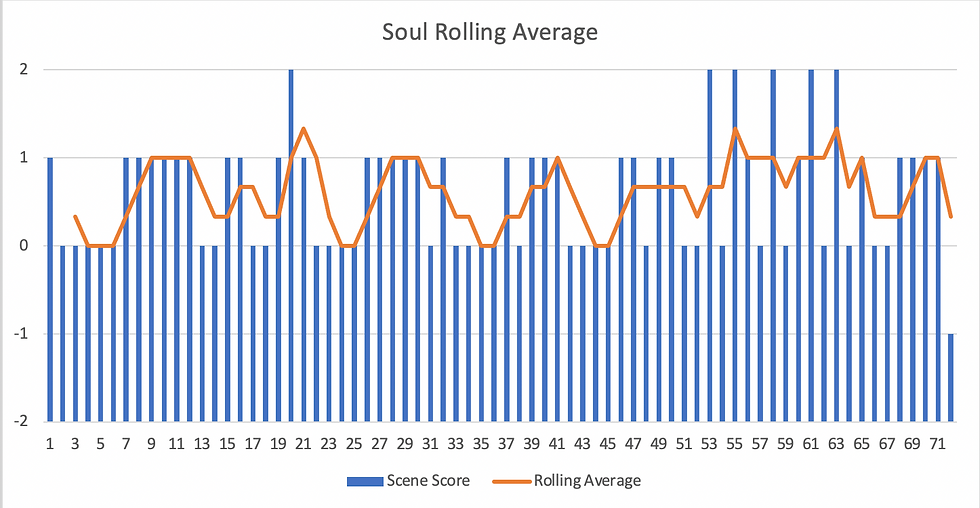Soul
- spoonmorej
- Dec 26, 2020
- 3 min read
Soul offers good humor and visuals for a heartfelt attempt to perform a new song with the familiar Pixar ensemble. It is always enjoyable to sit down and watch a Pixar story with fresh eyes, but this time, the eyes stay dry.
It is so weird to see Pixar committing to move beyond its decade of sequels with bold, stand alone films like Onward and Soul. They are everything I want in animation: high budget and unbelievable detail with stories never told before, yet somehow they fall short of the Pixar classics. The only way I can assume why is because these new films, both in Pixar and Disney, have abandoned the dramatic plotlines of good vs evil. There are no villains in the new animated films, which frees up a lot of the runtime to explore the depths of the main characters more effectively. The protagonists of these films have great arcs and personalities, portraying new emotions and life-challenging problems rarely seen in films geared towards children, but the drama that pulls children towards the screen is missing. The villain in this film plays more of a comedic end to a joke than an actual force to fear. The entire time the characters are rushing against the ticking clock, but I never felt anxious because the film kept cutting back to the bad guy flipping through filing cabinets—which was still humorous, just not enticing. He barely serves as an antagonist mainly because the story does not want him to be the antagonist; he is simply another character trying to find his worth in his tedious life. The conflict is supposed to be pushed by the characters’ motivations, and that is where the cracks show.
The two main characters have everything necessary to create dynamic arcs, yet I could not empathize with them when I watched their struggle. Even though they were both three-dimensional characters with thoughts and emotions bouncing off the screen, I barely felt anything. The worst part is, this film brings up so many ideas about life that beg conversation, but I have no passion to talk about any of it. The hints of a broader world the characters experience feel cheap instead of expanding, and the rules that are shown feel as if they were the only concepts the writers imagined stretched to the thinnest amount to fill the runtime rather than a breath-taking experience condensed under two hours.
Another interesting element of this film is the score. On the one hand is the Jazz running through the streets of Manhattan, and the rest of the film is a synthetic collection of rhythms and beeps reminiscent to Wall-E or an Apple loading-screen. When the Jazz pushes its way into the spotlight, it leaves little room for the rest of the film. It does not try to be the score either, it dances around to the beat of its own drum. It is spontaneous and inspirational in its own way, but unlike other films surrounding Jazz music—La La Land, Monsters Inc., Whiplash—this film’s score is neither contagious nor structured enough to carry it through its scenes. The synthetic beeps act very differently. They are almost inaudible, floating under the scenery of the film’s uniquely contrasting art style, only for it to crescendo when the emotion is reaching for that next level. The score has a strange duality that might be interesting if it had enough story to earn a second watch.
Overall, the emotion is the center focus in every scene, though it is light in the delivery. The story takes many unexpected turns, but the characters never really clicked with me. The writers strayed from the need of the ‘bad guy’ oriented plot to instead build up the two protagonists. Whether it works or not highly depends on the audience empathizing with those characters, which for me, personally, did not happen. The conflict is not personified for me to give it a face. I needed to feel the time crunch and the deadline as much as the characters. The Jazz is bold and improvisational to give an emotional punch rather than a solid memory of the beats, leaving a fleeting moment of "hey that sounded cool." I admire the writers trying to do new things and push the expectations of cinema and animation. I also believe they need more time to figure out how to write these stories effectively. Even if I do not revisit this film, I am still excited to see what Pixar is trying to do and where they are heading on their next adventure.

Looking at the cumulative score reveals how consistent this film is. Unlike Tenet, where it excels in action but stumbles in character, Soul continually builds on its development with each scene.

The grand average score calculated from the 72 scenes:
70.6%


Comments